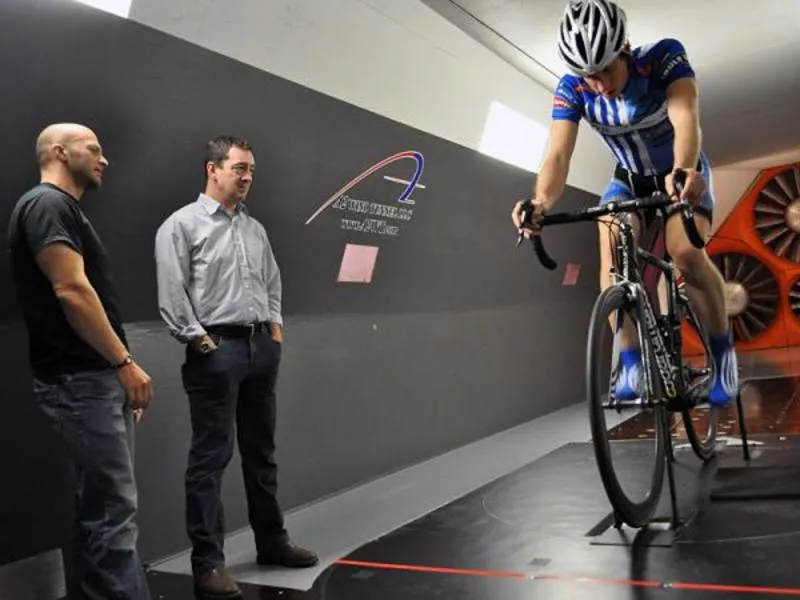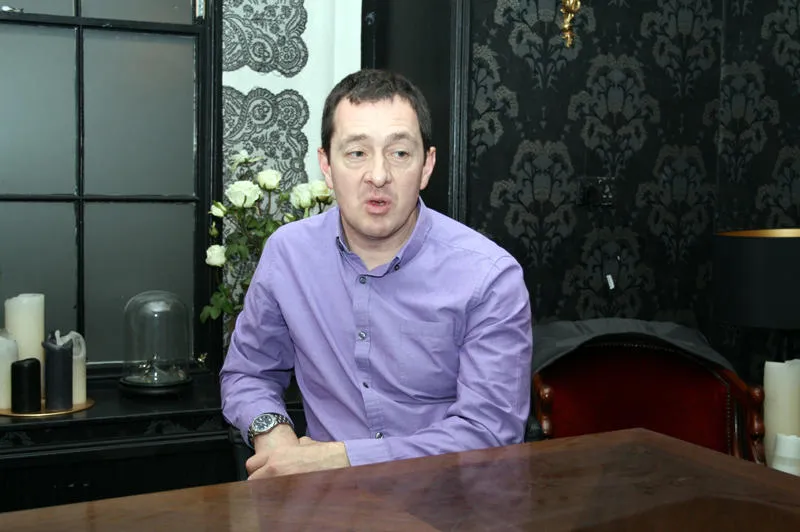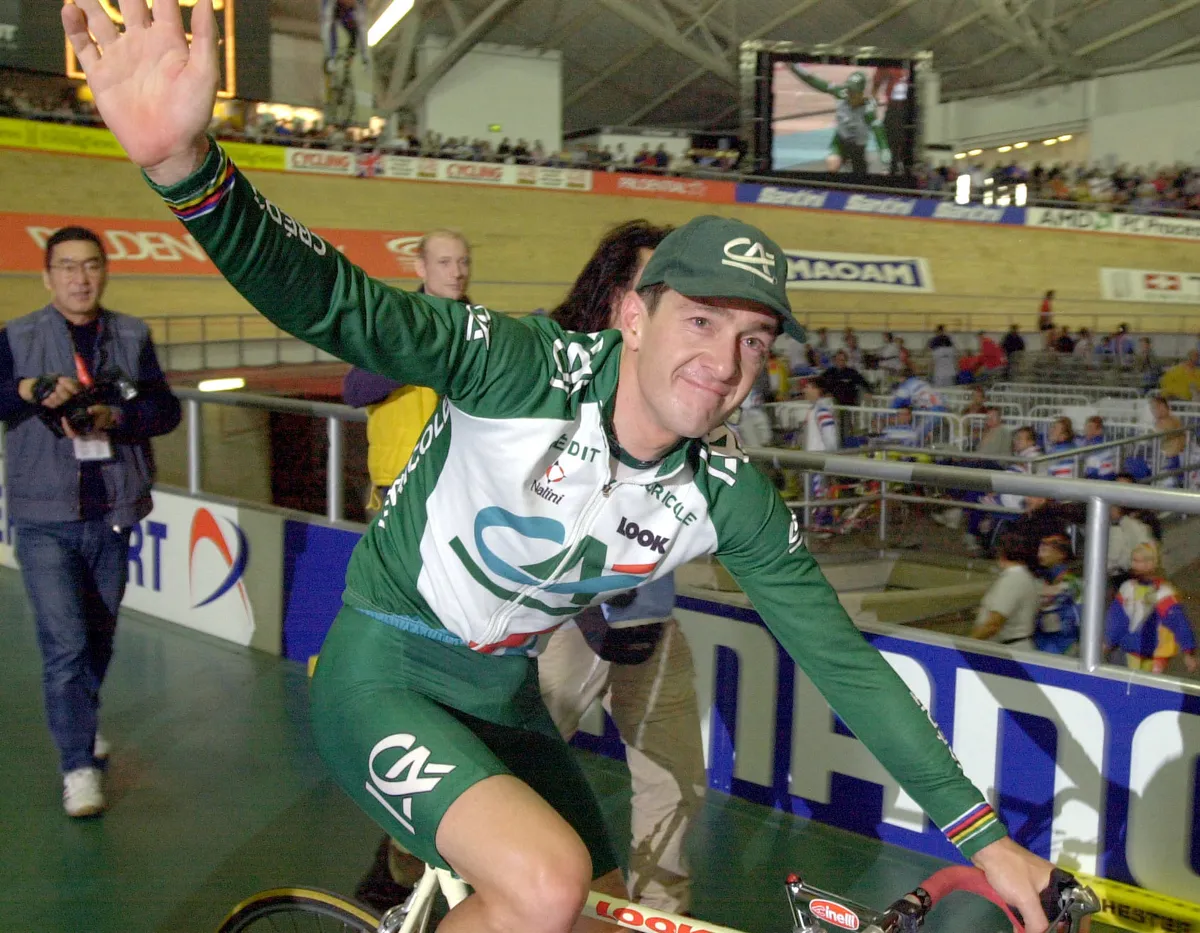When it comes to time trialling, Chris Boardman has done it all. As a rider he won an Olympic gold medal in the invididual pursuit, took the Tour de France prologue three times and broke the world hour record three times. He still holds records for the fastest average speed in a Tour prologue (55.152km/h) and the absolute hour record (56.375km).
After he retired he moved into the technological side of the bike industry, where he's had major involvement in the development of British Cycling's seemingly unbeatable Olympic bikes and kit (ridden of course by amazing athletes). He's also launched his own successful bike company, which produces a wide range of models but still has a special place for time trial machines.
Finally, as a commentator for ITV4 and the BBC in the UK, he's brought his expertise to a nation eager to learn more about the exploits of its top cyclists.
As part of our focus on time trialling this week, we spoke to Chris about his background and how he improved against the clock, his opinion on the rider versus technology, and where he thinks cycling will head in the next 10 years.
How did you get into cycling – was time trialling always there?
I kicked off back when I was 13 years old. There was a little race outside Chester, a 10-mile TT that was part of the social scene. The nature of the time trial got me interested.
I wouldn't say I was bullied at school, just not good at anything. [With the TT] I could set a marker and it was just my marker. Next week I had another go and took a minute off it. I eventually beat someone else in a juvenile race later that year. I realised I could do something others couldn't.
The nature of time trialling is about challenging yourself. If I'd done a road race I'd probably have got a kicking and wouldn't have persisted. Time trialling has a level of competitiveness that people can cope with – you can race other people, and you're racing against yourself.
How did you go faster?
Like everyone else there's a level of 'do it again and you get better'. Performance is a fascination. You go X speed, you want to go faster. I slowly went forward, I'd do more of it, do it regularly, do it better. Until I bumped into Peter Keen…
He gave me something I missed out on. I missed academia. He gave me structure. The simple process of what happens as a result of something. You could apply it to a training session, the entire year, a specific training exercise. It was a fascinating learning process. I was utterly, brutally honest with myself, accepting the fact that I was the limiting factor. I'd reflect and practise, self analyse and maximise every experience.
I used that all the way through to the Olympics, so Peter Keen was the big start to move forward. The term didn't come in until 15 years later but it was “the application of marginal gains". Because he had an academic background and an utter fascination with making me go faster, I was his experiment. I was fine with that.
We looked at the component parts and how we could improve each one of those things. We looked at aero as a component, because 90 percent of energy spent is pushing air out of the way. Our tools were pretty blunt – a full length mirror and an ergometer. We looked at my sillhouette, how we could reduce that.
In our arrogance, what we never verbalised was that part of the success for us was coming up with the answer. But we were limited to two imaginations – we never let anybody else have an opinion. Only years after, I realised that people who don't think like me are the ones who bring breakthroughs for me.
What's changed in terms of physical performance and technology since you were competing?
The sport is changing painfully slowly. There's a trickle through of the knowledge from Team Sky and the British team, led by one or two individual performances. Those individuals have had a marked effect. They're seen having success by people, and those same people look more closely. Sky using skinsuits in road races and Cav winning the Worlds last year in a covered road helmet…
There's a better focus on the things that matter, a greater understanding of muscle physiology and diet. That's the natural way of things. Lots of people have ideas but it doesn't stand out until you give everyone a good kicking.
When Peter Keen came along, they let go of the tradition. Cycling is a sport that's utterly steeped in tradition, which witholds progress.
The physical side is more where the progress is – the aero goes hand in hand. Certainly in the UK, the numbers aren't changing, they're just getting more efficient [at using their power]. For some it's worth committing time to an uncomfortable position because it will save time.

Chris advising on setup for UnitedHealthcare, who Boardman sponsored in 2011
How have you used this to develop products outside of British Cycling?
You need to stay in touch with new thinking. I stepped back from the R&D with British Cycling and that gives me more freedom to develop new things.
The British Cycling stuff can't be touched but I know it's incredibly valuable: I know where not to look, where not to waste time, the proportional gains from everything. I know what tools to use, I've been through computational fluid design, stress analysis and, to an extent, I know what people I want to work with.
I'm still cutting edge for our company, possibly up to 10 years from now. The ideas will progress annually, the methods, the tools and methodology will last 10 years.
The big one this year has been our TT bike for next year. It's one of the most fun projects we've done and we've used so much more resource than ever before. The first prototype is in the country now. Volume wise you won't sell many but it's the proving ground for other things. Aero is the biggest energy expenditure. That will continue to be my biggest passion.
Scaling back from BC has helped. Now I've got time to look into special development units. Rapid prototyping is massively underused as a manufacturing tool. You can use it to put things inside a frame that you can't do with any other method. It lets you move really quickly.
So we'll see UK based manufacturing?
We already do our design, rapid prototyping and have a special development unit here in the UK. We're constantly looking at that and it does make sense. Time becomes an issue.
The people in the Far East are brilliant. In our first year we had five out of 10,000 returns for genuine faults. But they don't do new things.
What are the implications of all this tech for cycling and time trialling? Is it an arms race or an integral part of the sport?
It's an integral part of the sport. When one individual or group of people, ie Team GB, invest and take a leap forward everyone cries foul. I think that's ungenerous.
We read the same rules, we choose where to invest. It's not extra money – R&D wasn't expensive but it was a good spend. It was properly targeted at the things that make the biggest differences, namely air resistance. Other countries are verging on negligent not to pursue this endeavour.
What about the riders?
Chris Hoy spent hours in a wind tunnel looking at his own position. Then he went away and trained for two years in that position. That's an athlete's commitment. He made those changes. He said, "I can ride those narrow bars." Vicky Pendleton did the same thing. I've got no time for people who say that's not fair.
The way it goes depends on the UCI. They are doing a good job at the moment, striking a good balance. Julien Carron, their technical guy, he simply wants it to be fair. He's got pressure from two directions. The best rules are when you strip out as much as possible.
I offered to sit on their [the UCI's] technical committee but they declined, citing – correctly - that I had a vested interest. However valid this point is, if you don't take consultancy from people who are working in 'the now' then your regulations will always be reactive firefighting rather than proactive fire prevention.
I don't think we'll see a great deal of change in the next four to eight years. I can't see where the next big directional change is. The frame is unchanged, the wheels have been unchanged for decades, clothing is getting more heavily regulated, and with helmets they're imposing a box they have to fit into. I think the rules are going to start to do their job.
For the last eight years the focus has been on changing how the game is played, the component parts of the event – there's been a letting go of the sport. It has become about the numbers. You need an athlete to deliver it – the pain, the pressure. There's a lot less hiding now.
Finally, when these future developments come to pass, how much time do you think a top rider will save in an hour long TT?
Less than a minute – but leave it with us!

